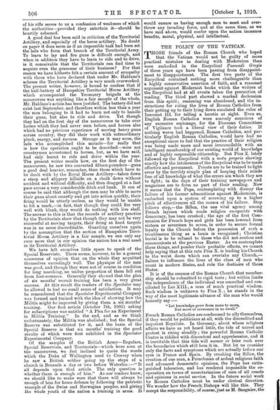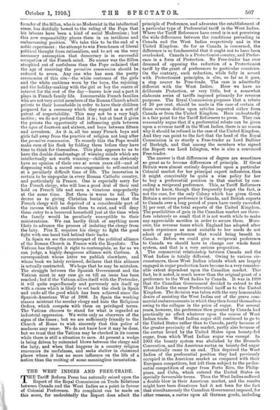THE POLICY OF 1 . 14.6 VATICAN.
THOSE friends of the Roman Church who hoped that the Vatican would not be guilty of more practical mistakes in dealing with Modernism than were embodied in the Encyclical Pascendi Gregis of three years ago have been passing from disappoint- ment to disappointment. The first °two parts of the Encyclical contained nothing more challengeable than a highly conservative assertion of faith, and a reasoned argument against Modernist books which the writers of the Encyclical had at all events taken the precaution of reading. The third part showed a marked declension from this spirit ; reasoning was abandoned, and the in- structions for ruling the lives of Roman Catholics from their getting up to their lying down emulated the rules of Innocent III. for telling a heretic at sight. Even so, English Roman Catholics were scarcely conscious of any excessive espionage, for the Diocesan Committees of Vigilance took a liberal view of their duties. If nothing worse had happened, Roman Catholics, and par- ticularly English Roman Catholics, would have had no exceptional cause to feel that the practice of their religion was being made more and more irreconcilable with an intelligent membership of our existing world of knowledge and of highly responsible citizenship. But Pius X. lately followed up the Encyclical with a rnota proprio showing exactly how the intolerance of the Encyclical was to be made effective and permanent. Priests are to be trained to fight error by the terribly simple plan of keeping their minds free of all knowledge of what the errors are which they are to fight; in the days of their training newspapers and magazines are to form no part of their reading. Now it seems that the Pope, contemplating with dismay the failure of his former admonitions against Modernism, is embarked upon a system of screwing up to a higher pitch of effectiveness all the causes of his failure. Step follows step,—the Sillon, the one -vital agency among French laymen which made religion co-operate with democracy, has been crushed ; the age of the first Com- munion for French boys and girls has been lowered from sixteen or seventeen to seven, in order to secure formal loyalty to the Church before the possession of such a troublesome thing as a brain is recognised ; Christian burial is to be refused to those who did not confess and communicate at the previous Easter. As we contemplate these things, and ponder their probable effects, we cannot help saying that at this rate Pius X. is leading his Church to the worst doom -which can overtake any Church,— failure to influence the lives of the class of men who count in modern States, and rule the destinies of those States.
It is of the essence of the Roman Church that member- ship should be submitted to rigid tests ; but within limits the independence of the individual was consulted and con- ciliated by Leo XTTT., a man of much practical wisdom. Such wisdom is unknown to Pius X.; he stands in the way of the most legitimate advance of the man who would honestly say :- " Let knowledge grow from more to more,
But more of reverence in us dwell."
French Roman Catholics are condemned to ally themselves, if they would be politicians at all, with the discredited and impotent Royalists. In Germany, about whose religious affairs we have as yet heard little, the tide of unrest and protest is rising steadily ; the powerful Roman Catholic Centre is riddled with discontent and apprehension, and it is inevitable that this tide will sooner or later rush over the boundaries which still hem it in. But let us consider only the facts and symptoms which are actually before our eyes in France and Spain. By crushing the Sillon, the creation of one man, a Frenchman of ardent religious faith and advanced democratic opinions, the Pope has extin- guished toleration, and has rendered impossible the co- operation on terms of unsectarianism of men of all creeds and opinions in social service. In the future social work by Roman Catholics must be under clerical direction. We wonder how the French: Bishops will like this. They accept the responsibility, of course, just as M. Sangnier, the 'founder of the Sillon, who is no Modernist in the intellectual sense, has dutifully bowed to the ruling of the Pope that his labours have been a kind of social Modernism ; but this new responsibility places them in an invidious and embarrassing position. We take this to be the end of a noble experiment : the attempt to win Frenchmen of liberal political thought from rationalism, and to act on the very necessary assumption that democracy is in successful occupation of the French mind. No sooner was the Sillon atrophied out of usefulness than the Pope ordained that the age of receiving the premiere communion should be reduced to seven. Any one who has seen the pretty ceremonies of this rite—the white costumes of the girls and the white emblems worn by the boys, the rejoicing and the holiday-making with the girl or boy the centre of interest for the rest of the day—knows how real a part it plays in French family life. Innumerable French families who are not very strict members of the Roman Church admit priests to their households in order to have their children prepared for a ceremony which they regard as a sort of patent of respectability. This may not be a very high motive ; we do not pretend that it is ; but at least it gives the priests the opportunity of influencing girls between the ages of fourteen and sixteen, and boys between fifteen and seventeen. As it is, all too many French boys and girls fall away from the practice of religion not long after the premiere communion. To remedy this the Pope would make sure of his flock by folding them before they have time to think for themselves. This plan appears to us to have the double disadvantage of winning minds which are intellectually not worth winning—children can obviously have no opinion of their own at seven years old—and of dispensing with a sacred encouragement to self-restraint at a peculiarly difficult time of life. The innovation is certain to be unpopular in every Roman Catholic country, and particularly in France. One is especially sorry for the French clergy, who will lose a good deal of their real hold on French life and earn a vicarious unpopularity at the same time. But there is worse to tell. The decree as to giving Christian burial means that the French clergy will be deprived of a considerable part of the income which enables them to exist, and will deny them entry to a bereaved household just at the time when the family would be peculiarly susceptible to their ministrations. We can hardly think of anything more likely to advance the process of isolating the clergy from the laity. Pius X. requires his clergy to fight the good fight with one band tied behind their backs.
In Spain we see the counterpart of the political alliance of the Roman Church in France with the Royalists. The Vatican has thought it right to contemplate, so far as we can judge, a highly dangerous alliance with Carlism. A correspondent whose letter we publish elsewhere, and whose book we lately reviewed, declares that this alliance is actually contracted. We hope that he may be mistaken. The struggle between the Spanish Government and the Vatican must in any case go on till an issue has been reached ; but if the Vatican allies itself with the Pretender, it will quite superfluously and perversely mix itself up with a cause which is likely to set back the clock in Spain and undo all the good which has been achieved since the Spanish-American War of 1898. In Spain the working classes mistrust the secular clergy and hate the Religious Orders, which compete with them on privileged terms. The Vatican chooses to stand for what is regarded as industrial oppression. We write only as observers of the . signs of the times ; but we are sufficiently friendly to the Church of Rome to wish sincerely that this policy of madness may cease. We do not know how it may be done, but we trust that the Vatican may be checked in its course while there is still a situation to save. At present a wedge is being driven by reiterated blows between the clergy and the laity, and when that happens in a country religion renounces its usefulness, and seeks shelter in cloistered places where it has no more influence on the life of a nation than the reciting of some meaningless incantation.



























































 Previous page
Previous page